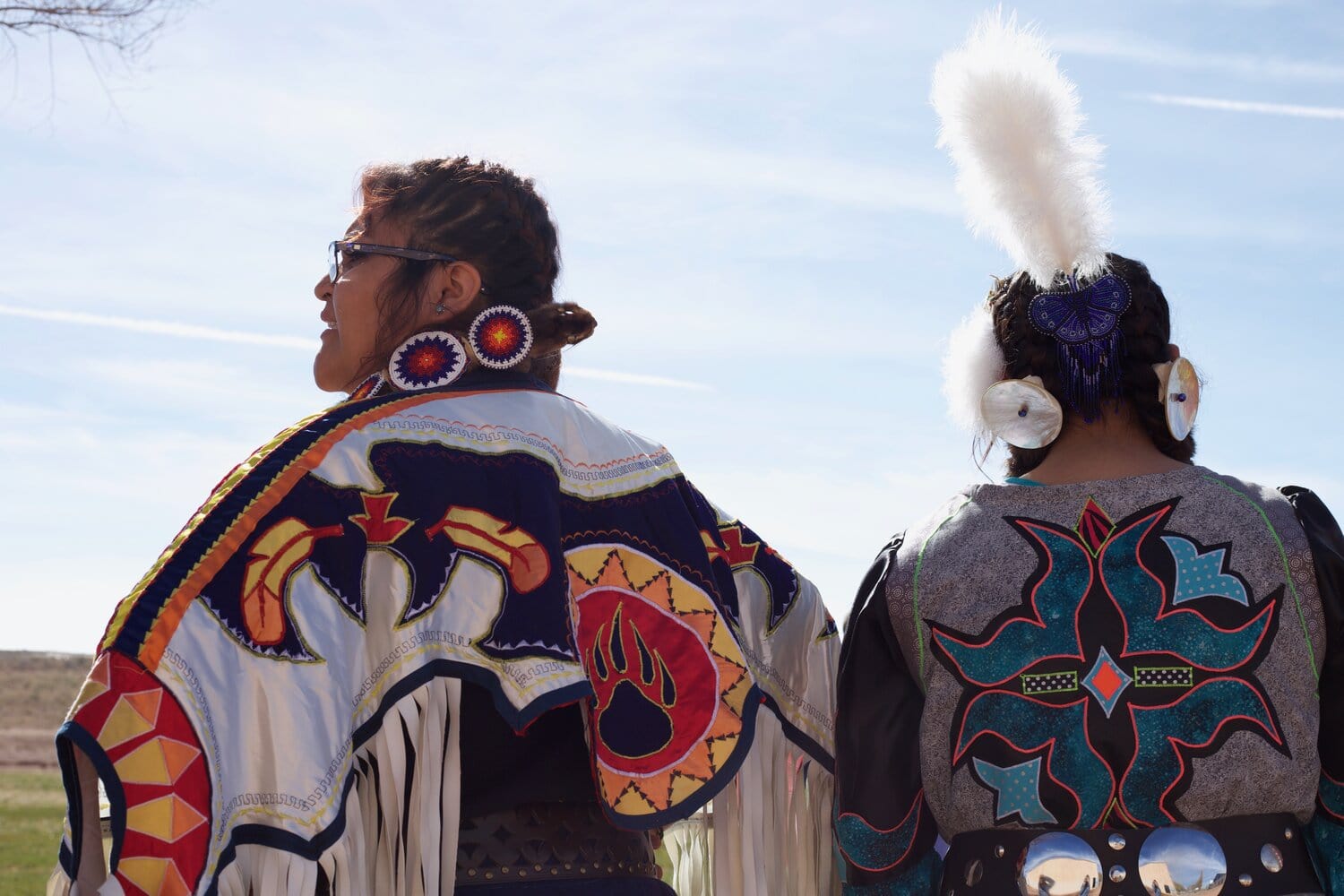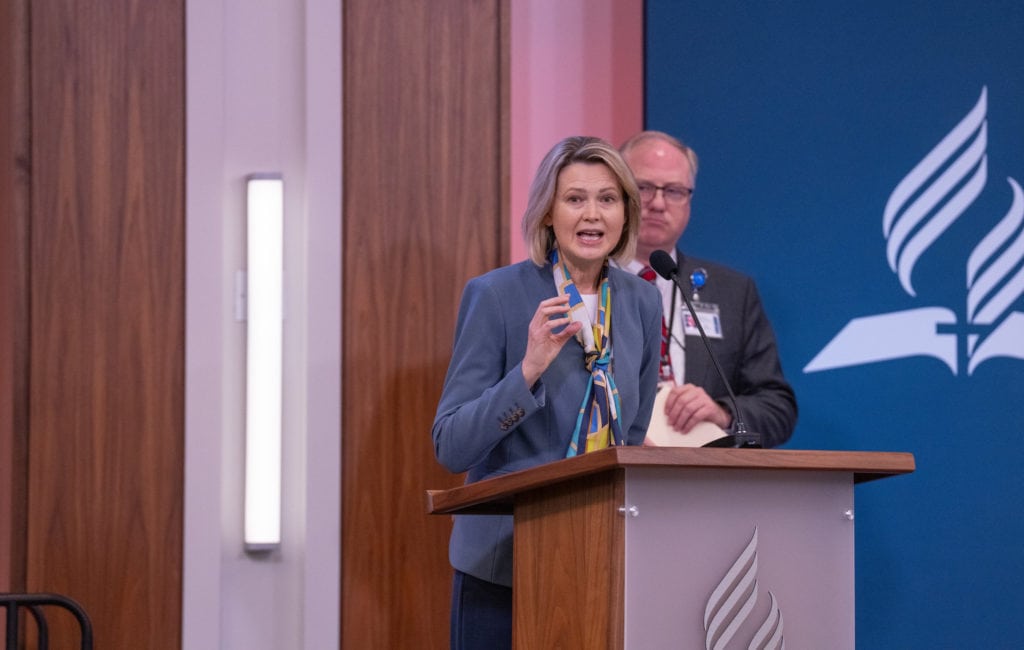
On the final day of the 2023 North American Division Year-End Meeting, Bettina Krause, a member of the NAD Doctrine of Discovery Writing Committee, editor of Liberty magazine, and associate director of Public Affairs and Religious Liberty, presented the NAD’s proposed statement regarding the Doctrine of Discovery (DOD).
This doctrine, established in 1493 (though it has roots as far back as the 11th century) by Pope Alexander VI, stated that any land not inhabited by Christians was available to be “discovered” by European explorers and, in the name of their sovereign, claimed. This document was the foundational justification for the abuses of colonialism for centuries, giving Christian governments self-appointed rights to invade and seize indigenous lands and dominate Indigenous People.
At the Year-End Meeting in 2022, Krause had discussed the issues and problems in the Doctrine of Discovery and its relevance to the world, the U.S., and the Adventist Church today. She shared that the consequences of this doctrine have endured and are part of our international law. As recently as 2005, the Supreme Court acknowledged the continued relevance of this doctrine to U.S. property law in a Native American land dispute case.
Krause commented during her 2022 presentation that many churches are now seeking to acknowledge that “Christianity itself has been perverted to justify acts of colonization and oppression.”
The Adventist church is now one of those seeking to make acknowledgments.
When introducing the document, Rick Remmers, DOD writing committee chair and assistant to the NAD president, urged delegates not to be lured into the temptation to view it through a political lens, but instead to look at it as it pertains to mission.
“This statement is designed to encourage reconciliation and to remove a barrier to our church’s ability to minister to Indigenous populations throughout the NAD,” Remmers said.
An NAD writing committee, announced during Krause’s 2022 presentation, completed its work on a statement during the past year, and it was this proposed document that Krause read to the delegates on October 31.
The committee included representation from Indigenous members and leaders, and the document was reviewed by the Native American Advisory, which “endorses and strongly encourages adoption of it,” Remmers said.
Krause read through the entire statement while delegates followed along with paper copies.
“From its inception, the Seventh-day Adventist Church has sought to reflect Christ’s ministry of healing and reconciliation,” the document begins. “In a world devastated by human violence and selfishness, Seventh-day Adventists, as followers of Christ … deplore human actions and attitudes, past and present, that have misrepresented God’s character and contributed to the profoundly broken structures of today’s world.”
The document continues with a brief explanation of the history of the Doctrine of Discovery, and then strikes at the heart of the issue the statement is meant to address — the treatment of Indigenous Peoples.

“Through the centuries, the doctrine continued to be used to justify policies aimed at the eradication, assimilation, and enslavement of Indigenous Peoples,” the document reads. “Centuries of dehumanization, subjugation, and exploitation of Indigenous Peoples, often under the banner of Christianity, compel a response from those who bear Christ’s name.”
The final paragraph of the statement concludes: “We therefore unequivocally repudiate the Doctrine of Discovery and the ideas and beliefs that undergirded it, and we fully commit ourselves to create and foster healthy, respectful, and equitable relationships with the Indigenous Peoples in the United States, Canada, Bermuda, and Guam Micronesia. In doing so, we will continually seek to reflect — within our churches and institutions, and within our broader communities — the true character of the God we serve.”
The discussion and commentary that followed the reading of this statement was overwhelmingly positive.
“This is massive,” Tracy Wood, director of Youth and Young Adult Ministries for the NAD, said. “For our youth and young adult generations to see that we’re addressing this history is a huge step forward.”
Carmela Monk Crawford, editor of Message magazine, said, “I believe this statement is life-affirming, culture-affirming, history-affirming, and prophetically affirming.” She also asked leaders how they wished this statement to be used.
Remmers replied that it would open doors to further ministry to Indigenous Peoples if they can clearly see where the Adventist Church stands on this issue.
“For those who have been unaware of this doctrine and its use and misuse through the years, this statement provides some information and education for them,” Remmers added. “It will help people be better-informed and responsive to these issues.”
Michael Campbell, director of Archives, Statistics, and Research for the NAD, shared his perspective that this statement falls in line with the “spirit and ethos” of early Adventist pioneers. “They were activists, but allowed their faith to inform their politics, not the other way around,” he said.
Ben Jones, president of South Central Conference, commended the committee and leadership for their courage. Then he added, “I’m also grieving a little that a church that preaches truth has to work hard at saying truth.”
Jones shared that he is only five generations removed from his enslaved ancestors and urged leaders to “do more than write a statement and think it’s done.” He asked that they look at policies and at how the church delivers ministries and distributes money. “We need to make sure as a church we are going to demonstrate to a broken world what truth looks like and what truth does to make a difference,” he said. “This will make our children say, ‘This is my church.’”
Some commenters were hesitant about the statement’s use of the word “responsibility,” citing it as a word that opens doors to legal action. Others encouraged leaders not to worry so much about making statements and focus more on helping people around the world entrenched today in war, genocide, and other violence.
Miguel Crespo, president of New York Conference, echoed this sentiment when sharing his personal experience working with Native American Adventists — the group which, he says, is the hardest to reach.
“They see the Christian message as the white man’s gospel,” he explained. “Their love for Jesus is amazing, despite how the church has treated them, but one of the things they always say is, ‘It’s just words.’ The treaties the government made were just words. This statement could be construed as ‘just words.’ If we’re serious about this, we need to take initiative to bring in more Native American pastors and teachers so we can better reach Indigenous populations and add something to the words.”
As chair of the Native American Advisory for a decade, Ken Denslow, former assistant to the NAD president and current Lake Union Conference president, spoke from firsthand experience listening to and working with Indigenous Peoples.
“It shouldn’t stop at this,” he said plainly. “We need to invest much more heavily in caring for Indigenous Peoples. But to be clear, they are also looking for our words.”
Denslow explained that the original idea for this statement came from the advisory five years ago, and the initial writing committee was made entirely of Indigenous Peoples. The makeup of the group was changed because, as Denslow said, “This is a fixing of the past, and we — people like me — need to acknowledge that. It’s time for us to step up and make a statement that we do not support the injustice of the past, and I am so glad this document made it to the floor.”
When voted, the statement on the Doctrine of Discovery was carried.
The original version of this story was posted on the North American Division news site.